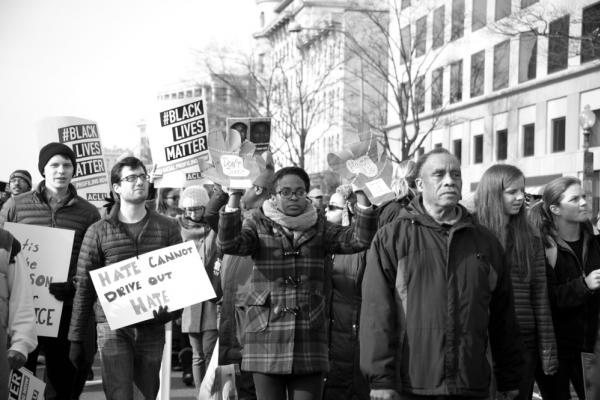In the wake of Sandra Bland’s death, I’ve seen comments from other white Christians on social media defending the arresting officer, denying that Sandra Bland was mistreated, blaming her for what happened, and denying that race had anything to do with what happened to her. Their responses were so knee-jerk automatic that I probably could have written them ahead of time before learning anything specific about the events in question. We humans can be quite tribal, and we instinctively tend to identify with the people who are most like us.
Many whites balk at the suggestion that their views and assumptions might be racist because they know themselves to be moral people who live decent lives and maybe even have some black friends. They certainly don’t hate anybody, and they aren’t supporters of the Ku Klux Klan. Because they understand racism on an individual rather than systemic level, it seems impossible to hold together an image of oneself that contains both “good person” and “racist.”
Yet individual guilt and hatred often have little to do with white America’s unwitting participation in the institutional racism of our society. We can’t avoid bearing a resemblance, warts and all, to the culture that raises us, and it takes a lot of critical thinking and intentional unlearning to change that. Pretending otherwise is more harmful than honestly acknowledging the biases that have been programmed into us in the first place. Perhaps it would be easier for us to admit our subtle participation in racism if we remembered that even Jesus had to overcome ingrained prejudice in himself.
It’s a strange encounter, one that I have never heard discussed in a sermon. Christian doctrine professes that Jesus is fully God and fully human, but getting into the messy implications of the Messiah’s human side can make for an uncomfortable Bible study. In Mark 7:24-37, Jesus meets a woman who comes to him seeking healing for her daughter. Apparently she is “a Greek, born in Syrian Phoenicia” — a Gentile considered to be spiritually and racially inferior to a Jew, much less a rabbi like Jesus. And on top of that, she is a woman approaching a man. Disturbingly, Jesus is initially unwilling to help her:
“First let the children eat all they want,” he told her, “for it is not right to take the children’s bread and toss it to their dogs.”
Jesus calls the woman a dog. He uses a racial slur against her. His fellow Israelites are children who have first claim on his time and energy, but foreign pagans like this Syro-Phoenician woman and her daughter are dogs.
The idea of God-in-human-skin getting caught up in human prejudice and garden-variety ethnocentrism is unsettling, but it shouldn’t actually be all that surprising. As Episcopal priest David Henson pointed out in an article back in 2012, Jesus spent his time on earth as a Jewish man in first century Palestine who would have been taught to give thanks in his daily prayers for being born a Jew rather than a Gentile, and a man instead of a woman. As immersed as he was in that culture, Jesus could not have avoided the effects of sexist, racist narratives that had shaped his identity from childhood. Inequality was so subtly ingrained in the people and structures around him that it could be completely taken for granted, at least by those whose lives were never adversely affected by it — kind of like racism in 21st century America.
This is the son of God we’re talking about here. If he couldn’t remain colorblind in the midst of an unjust society, than we certainly can’t claim to be colorblind either. But the important part of the story is what happens next:
“Yes, Lord,” she replied. “But even the dogs under the table eat the children’s crumbs.”
Like so many throughout history who have internalized their low status in society, the woman does not question Jesus’ dehumanizing language. Yet she challenges his assumptions nonetheless, and is the only character in scripture whose repartee ever stumps Jesus in a debate.
The looks that passed between them at that moment, and the thoughts in Jesus’ mind, are not recorded. Perhaps there was a moment of surprised silence as Jesus reexamined the stereotypical assumptions he had made about this representative of “the other” standing in front of him. He even seems to have his perspective on women and gentiles changed by her argument.
We’ll never know the details of that pivotal moment, but the next words Jesus utters demonstrate a change of mind and a change of heart: he agrees to heal the woman’s daughter.
As whites in America, we are all complicit in systemic racism. The story of Jesus’ encounter with the Syro-Phoenician woman illustrates the way that none of us can come out of a broken society unscathed by its deceptions and injustices. We had no control over the race, social class, or society into which we were born, but moral choice enters the picture at the moment that we are confronted by the people whose humanity we have overlooked.
When we encounter those who have been oppressed by a system that has always worked just fine for us, we have a conscious choice about whether we will make space in ourselves to receive the truth of their experience. Will we have the courage to listen with an open mind and to recognize ourselves in the other? Will we have the humility to admit that we have been living with harmful misconceptions and to change our course?
Jesus’ example demonstrates that regardless of the ways we have unknowingly been part of the problem due to ignorance or fear, we can choose to be individuals who reject racism in ourselves and our world, committing ourselves to the slow, hard work of transformation.
Got something to say about what you're reading? We value your feedback!

